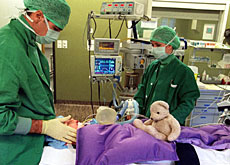Poorer families squeezed by rising health costs

Many Swiss families are suffering because health insurance premiums are rising faster than subsidies for those on low incomes.
Traditionally, the cantons provide income-linked support to people who have difficulty paying their premiums.
But in many regions the funds available for these subsidies have not kept pace with the rise in insurance costs.
Across Switzerland, health insurance premiums have risen by an average of 4.3 per cent this year, but in many cantons low-income families have seen no increase in their subsidy.
And in some cantons it has become harder to qualify for assistance, so that some families have stopped receiving support altogether.
Poor getting poorer
The trend has caused alarm among counselling services and charities that provide help and advice to those on low incomes.
“Health insurance premiums are always a big element in the family budget,” said Rita Hermann, head of the Swiss trades’ union federation’s budget advice centre.
“Many families already find it difficult to pay the obligatory first SFr300 ($241) per adult.”
Cantons receive around half the money for their subsidies from the federal government. So far that share of the money has kept pace with the rise in premiums, but many cantons have not increased their own contribution accordingly.
“This means that levels of subsidies, and eligibility for receiving them, vary widely from canton to canton,” Hermann told swissinfo.
Rising costs
Meanwhile, health care costs are rising across the country. A family with three children is now likely to pay at least SFr10,000 a year in insurance premiums.
“It’s a fact that two-thirds of families in Switzerland now have less disposable income than at the start of the 1990s,” said Jürg Krummenacher, director of the catholic charity, Caritas.
“The cost of health insurance has really crossed the pain threshold.”
Middle and low-income families have been especially hit hard. And obviously single parents are having difficulties too.”
People who are unable to pay their health insurance premiums can turn to their local community for welfare payments.
This may ease pressure on cantons, which have not raised their subsidy contributions, but Caritas believes many families are ashamed to apply for welfare and simply try to make do without the money.
Referendum
In some cantons there has been a backlash against the cutbacks. In canton Ticino, the Social Democrats are pushing for a referendum to prevent the proposed SFr20 million savings in health cost subsidies.
The rising cost of health care has been a cause for concern in Switzerland for some years now, but so far no one has been able to come up with a solution acceptable to all parties.
Only last month the Swiss parliament rejected government proposals aimed at revising the health insurance law.
The revised law would have limited the number of doctors, relaxed the rules on the import of cheaper drugs and reduced the health services covered by mandatory health insurance.
Even though doctors as well as patient organisations were in favour of cutting costs, hammering out the details of savings plan proved too difficult.
swissinfo with agencies
Average premium in 1997: SFr166. In 2003: SFr269.
Health care costs have risen on average 7% a year since 1997.
The government budgets SFr2.3 billion a year for subsidies for health insurance premiums; the cantons are expected to contribute around half that sum.
Around 2.5 million people (one-third of the population) in Switzerland benefit from the subsidies.

In compliance with the JTI standards
More: SWI swissinfo.ch certified by the Journalism Trust Initiative










You can find an overview of ongoing debates with our journalists here . Please join us!
If you want to start a conversation about a topic raised in this article or want to report factual errors, email us at english@swissinfo.ch.